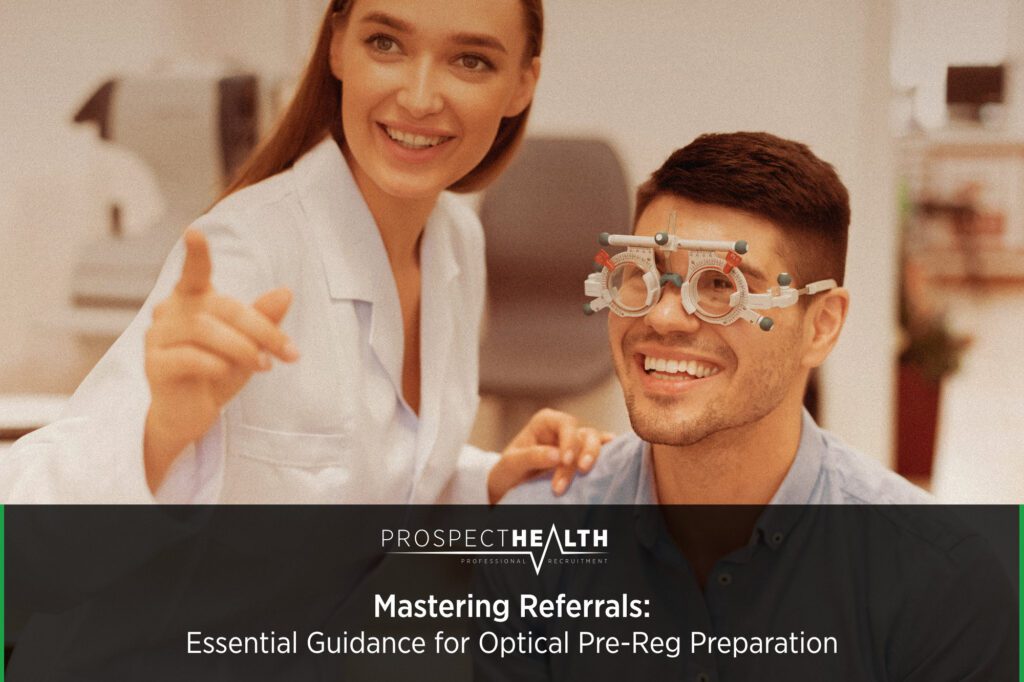
Mastering Referrals: Essential Guidance for Optical Pre-Reg Preparation
As part of your pre-reg preparation, developing confidence with referrals is a crucial skill. Not only are referral letters an important part of patient care, but they’re also a common focus in your assessments and OSCEs.
In our recent webinar, Anisa guided trainees through how to approach referrals effectively, what to include, and how they can strengthen both your clinical practice and your exam performance.
To access all our pre-recorded webinars via our online learning management system, please complete the form below:

Access our pre-recorded Optometry Webinars
Why Referrals Matter
A referral is more than just paperwork — it’s a professional handover of care. It ensures your patient is managed by the right clinician and that their care pathway is smooth. Remember, even once you refer, you’re still responsible for making sure the referral is sent correctly and any queries are addressed.
Referral Categories: Routine, Urgent, and Emergency
Understanding urgency is key:
- Emergency: same-day or within 24 hours (e.g., acute angle closure, chemical burns, macula-on retinal detachment).
- Urgent: typically within two weeks (e.g., wet AMD, vitreous haemorrhage).
- Routine: longer-term, often dependent on local waiting lists (e.g., stable cataracts).
Local referral pathways may vary, so always check guidelines for your area.
What to Include in a Referral Letter
A strong referral should read like a clear, concise story:
- Patient details (name, address, contact number, GP surgery)
- Practice details (address, phone number)
- Relevant clinical findings (VA, refraction, anterior/posterior eye findings)
- Supporting evidence (fundus photos, OCT scans, fields)
- Clear statement of urgency
- Any discussions or advice given to the patient
Keep it professional, relevant, and focused — avoid unnecessary detail.
Case Examples from the Webinar
- Amblyopic Child: include VA, BV status, age, family history, stereo results, risk factors, and management recommendations.
- Cataract Surgery: document VA, type and severity of cataract, symptoms (glare, reduced vision, impact on driving), relevant medical history, and practical considerations (e.g., ability to lie flat).
These examples highlight how referrals should tell the patient’s story while giving the receiving clinician everything they need to act promptly.
Building Confidence Through Practice
Referrals are not just about knowledge — they’re about communication. During OSCEs, you may also be asked to explain conditions in layman’s terms, such as describing wet AMD or cataracts to a patient. Practice explaining conditions to family or friends to refine this skill.
Sample OSCE-style questions also cover areas such as:
- Contact lens materials and fitting considerations
- Data protection and patient consent
- Dispensing calculations and safety eyewear standards
- Pharmacology basics (e.g., metformin, mydriatics)
These questions are designed to push you beyond theory and into practical, patient-centred problem solving.
Final Thoughts
Referrals are a vital part of optometry practice, and mastering them early will make you more confident both in clinic and in exams. As you continue your pre-reg preparation, focus on:
- Knowing referral categories and pathways
- Writing concise, professional referral letters
- Practising layman’s explanations for patients
- Reviewing OSCE-style sample questions
With structured practice and support, you’ll feel ready not only to pass assessments but also to deliver safe, effective care from day one as a qualified optometrist.
Are you preparing for your OSCEs and looking for career guidance too?
Prospect Health works with over 100 employers eager to hire newly qualified optometrists. Alongside revision support, we can help you secure the right role for you when you qualify.
You can call us at 01423 813 452 or email us at [email protected]
Or view the rest of our Optometry jobs here!

Next Up: 5 Top Tips for the pre-reg Optometry OSCE
The OSCE is a daunting exam. Our Diary of a Pre-reg Optometrist shares their top 5 tips for success in the OSCE (Objective Structured Clinical Examination) exams and effective communication…

VICTORIA ASHTON
Specialist Recruitment Consultant
I am an experienced recruitment professional with a diverse background spanning GP recruitment, the Commercial sector, Practice Management, and most recently, Optometry.
After completing my degree as a mature student, I embarked on my recruitment career and have since found the industry both challenging and rewarding…


